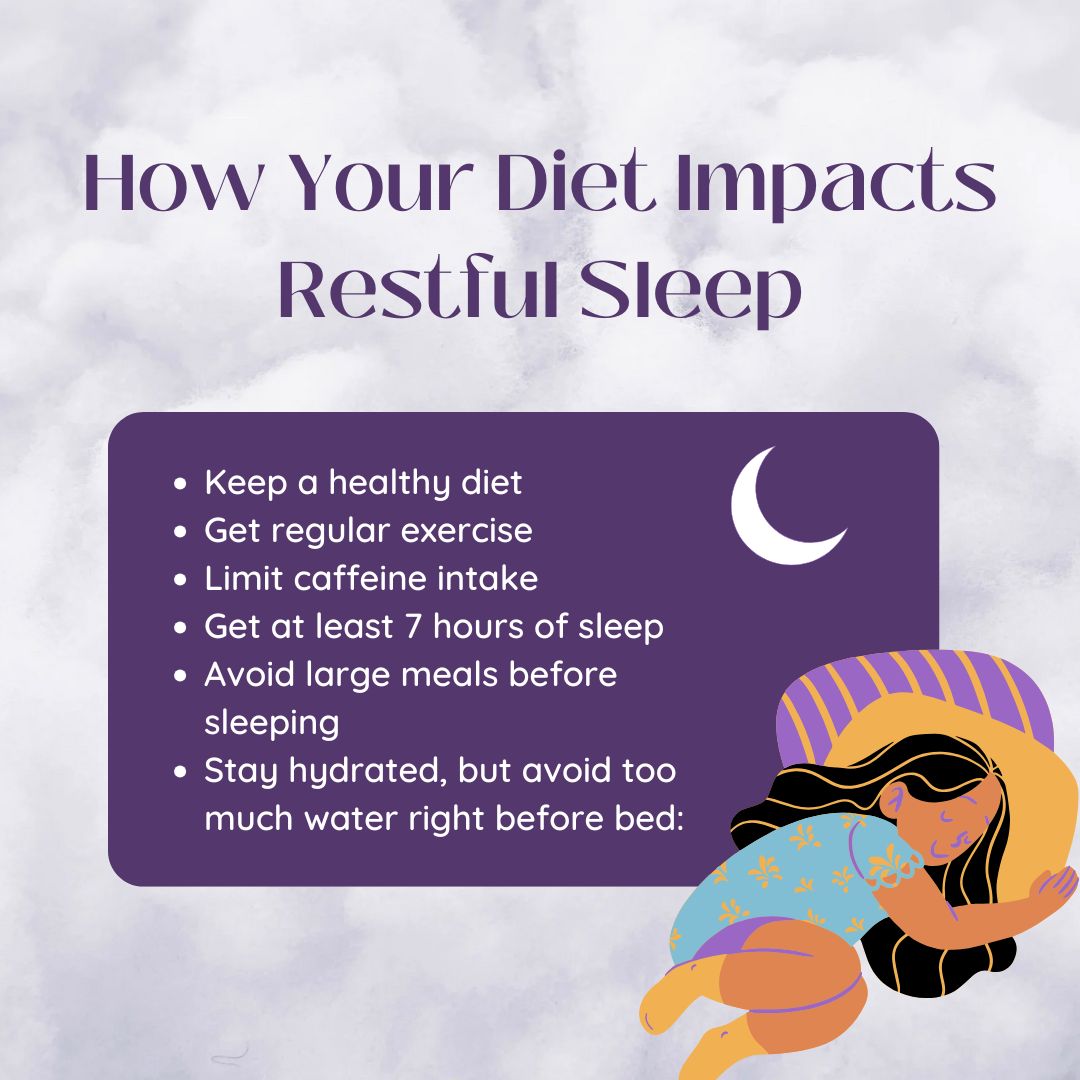The Connection Between Sleep and Health: How Your Diet Affects Your Rest
Tired All the Time? It Could Be Your Diet
If you’ve been tossing and turning at night or waking up feeling drained, it might not just be stress or screen time—your diet could be the missing link.
While sleep hygiene, blue light blockers, and evening yoga get most of the attention, what you eat (and when you eat it) plays a powerful role in your sleep quality. In fact, research shows that diet has a direct impact on your circadian rhythm, sleep hormones, and even how deeply you rest at night.
In this guide, we’ll explore:
-
How your diet affects your sleep
-
Which foods help or harm your rest
-
Smart eating habits for better nights
-
A sample meal plan to promote deep, uninterrupted sleep
Let’s dig in.
Shop sleep-supporting foods and teas →
Why Sleep Is Non-Negotiable for Your Health
Sleep isn’t a luxury—it’s a biological necessity that impacts nearly every aspect of your health.
When you sleep well, your body has time to restore, detoxify, and reset. When you don’t, everything from your mood to your metabolism suffers.
Benefits of quality sleep:
-
🧠 Improves brain performance, memory, and focus
-
🔋 Boosts energy and metabolism
-
🛡️ Strengthens your immune system
-
🩺 Regulates weight, hunger hormones, and digestion
-
❤️ Balances emotions and reduces anxiety
Even one poor night of sleep can lead to mood swings, sugar cravings, inflammation, and fatigue. And over time, chronic sleep loss has been linked to obesity, diabetes, depression, and heart disease.
The Diet–Sleep Connection: How It Works
Your sleep-wake cycle is guided by melatonin, serotonin, cortisol, and blood sugar—all of which are heavily influenced by the food you eat.
The gut (sometimes called your “second brain”) is the control center for many of these hormones. That’s why gut health and sleep quality go hand in hand.
What diet does for your sleep:
-
Enhances natural melatonin and serotonin production
-
Stabilizes blood sugar during the night
-
Reduces inflammation that interrupts sleep
-
Supports gut health and digestion (less gas and discomfort)
By improving your diet, you don’t just sleep more—you sleep better.
Top Sleep-Promoting Foods to Add to Your Plate
1. Magnesium-Rich Foods
Magnesium is known as nature’s “chill pill.” It helps your brain unwind, muscles relax, and promotes deeper sleep cycles.
Top sources:
-
Almonds
-
Pumpkin seeds
-
Spinach
-
Black beans
-
Avocados
A magnesium supplement or calming magnesium powder like this one before bed can also help.
2. Tryptophan-Containing Foods
Tryptophan is an amino acid that your body converts into serotonin (the “feel-good” hormone) and then melatonin (your sleep hormone).
Best choices:
-
Turkey
-
Eggs
-
Cheese
-
Tofu
-
Oats
A small tryptophan-rich snack an hour before bed can boost melatonin naturally.
3. Complex Carbohydrates
Unlike sugar, complex carbs digest slowly and help your brain release more serotonin.
Examples:
-
Sweet potatoes
-
Brown rice
-
Quinoa
-
Barley
-
Whole-grain toast
Avoid high-sugar snacks at night, which can cause energy spikes and crashes.
4. Herbal Teas and Sleep Drinks
Certain warm drinks naturally promote relaxation:
-
Chamomile tea
-
Valerian root tea
-
Lemon balm tea
-
Warm almond or oat milk
-
Tart cherry juice (natural source of melatonin)
Click here for top-rated bedtime teas →
Foods That Disrupt Your Sleep
Just as certain foods help sleep, others can completely ruin it—especially if consumed in the evening.
❌ Avoid these after 2–3 PM:
-
Caffeine: Stimulants in coffee, soda, energy drinks, and even chocolate
-
Spicy or fatty meals: Can cause indigestion and heartburn
-
Sugar: Blood sugar crashes at night disrupt deep sleep
-
Alcohol: May help you fall asleep fast, but lowers REM quality
Celebrity athlete Kyle Allen once mentioned that after adjusting his diet by cutting nighttime sugar and caffeine, his performance and sleep drastically improved. You don’t need to be an NFL player to benefit from the same habit.
Smart Eating Habits That Support Better Sleep
Beyond what you eat, when and how you eat also affects your sleep:
✅ Eat your last meal 2–3 hours before bed
✅ Keep dinner light and easy to digest (low-fat, moderate carbs, no fried food)
✅ Limit drinks 1 hour before bed to reduce bathroom interruptions
✅ Add a calming ritual after dinner: herbal tea, light stretching, or meditation
Professional baseball player Mike Yastrzemski follows a similar wind-down routine during his travel days to help his body recover from long flights and late-night games.
A Sample Sleep-Friendly Meal Plan
Here’s a daily meal structure packed with sleep-supporting nutrients:
🍳 Breakfast
-
Oatmeal with banana and a spoon of almond butter
-
Boiled egg
-
Herbal green tea
🥗 Lunch
-
Grilled salmon
-
Quinoa or sweet potato mash
-
Steamed broccoli
-
Glass of water with lemon
🥑 Dinner
-
Chickpea salad with avocado, greens, and pumpkin seeds
-
Tart cherry juice or chamomile tea
-
Light rice cake with nut butter (if hungry later)
🍒 Evening Snack (optional)
-
Greek yogurt with tart cherry puree
-
Magnesium supplement
The Role of Gut Health in Sleep
More and more studies show that improving your gut microbiome is one of the best ways to support better sleep. When your gut is calm and healthy, your brain sleeps easier.
Conditions like IBS, bloating, or even Lyme disease can interrupt your rest. If you’ve ever traveled between locations like Guadalajara and New York, you may have experienced sleep problems due to both jet lag and gut disruption.
A healthy, fiber-rich diet with probiotics and mindful meal timing helps restore balance to your gut and regulate your internal sleep clock.
Lifestyle Habits That Maximize Your Sleep-Optimized Diet
Your sleep-friendly diet works best when combined with solid bedtime habits:
🛏️ Keep a consistent bedtime—even on weekends
📵 Power down screens 60+ minutes before sleep
🌡️ Set your room to a cool temperature (60–67°F is ideal)
🧘♀️ Try guided meditation, journaling, or reading instead of doom-scrolling
🕯️ Consider calming aromatherapy like lavender oil
These small tweaks, paired with better nutrition, can lead to huge results.
Final Thoughts: Sleep Starts in the Kitchen
If you’re eating well but still waking up tired, it might be time to take a closer look at your plate.
Improving your diet doesn’t require cutting everything out. It’s about choosing foods that support hormone balance, reduce inflammation, and promote natural melatonin production.
By adding the right foods—and avoiding the wrong ones—you’ll start sleeping deeper, longer, and with fewer interruptions.
So next time you’re planning your wellness goals, don’t just fix your bedtime routine—fix your meals, too.
Shop sleep-supporting products and teas here → https://amzn.to/4l5hFDx

